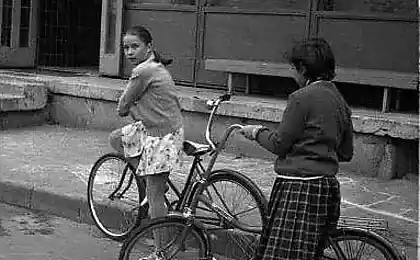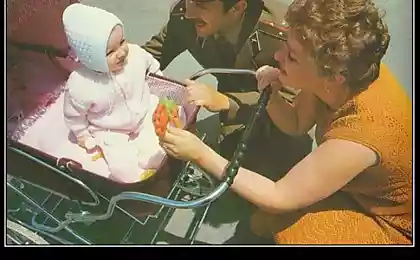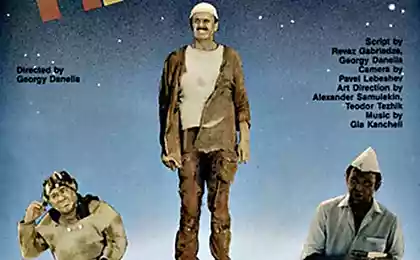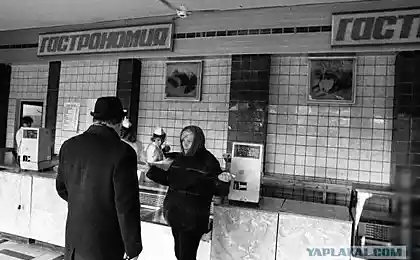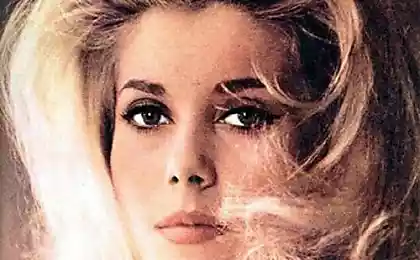2251
Housing in the Soviet box office hits
Consumer ideal inhabitant of the Soviet Union to a greater or lesser extent, exhaust the sacramental triad "apartment, villa, car." Already in 1980 the long-awaited communism each family to one sixth of the land covenant Nikita Khrushchev was to meet in a separate apartment. As shown, a great lover of fantasy maize have not been implemented so far. 22 years after the collapse of the Soviet Union on the material Onliner.by five popular movies 1970-80s decided to recall those apartments and rooms in which our grandparents grew up, parents, and many of us are with you.
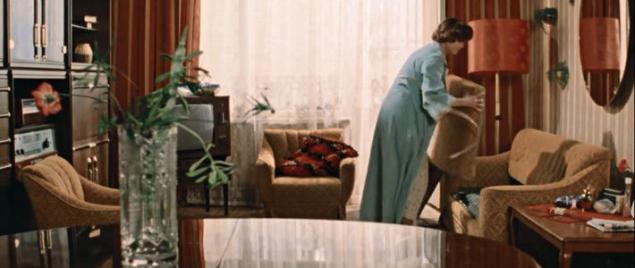
The main film, personified the achievement of "Soviet dream", both in public life and personal, was the "Moscow Does Not Believe in Tears", Vladimir Menshov's melodrama, released in theaters in February 1980. The history of the transformation of the provincial student and also a single mother in a successful leader, who has 40 years of life has just begun, pleased, according to official estimates, more than 80 million moviegoers, and a myriad of TV fans.

It all started here, in close, but surprisingly friendly workers' hostel in 1958. 3 people in the room, carpets and portraits of your favorite artists on the walls - painting, in principle, familiar, and 65 years later.
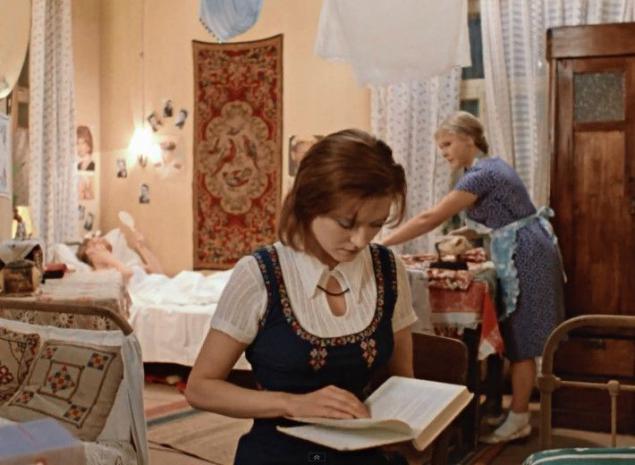
Operating hostel - the lot of millions of people in rural areas and provincial towns, mass move to "capital" to meet the needs of a growing industry in cheap labor.
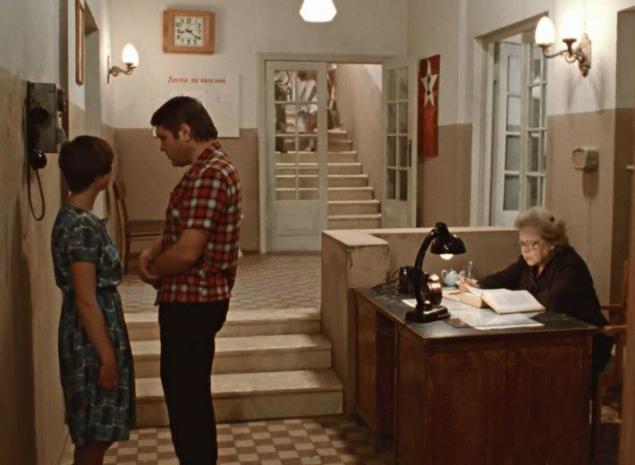
At the opposite end of the spectrum of all housing in Moscow were some luxury apartments in the "nomenklatura" Stalin's homes. Katya Tikhomirova, Vera Alentova heroine does not believe in tears Moscow, showed a distant relative of Professor, and in fact in this high-rise apartment in the area of the Rebellion.
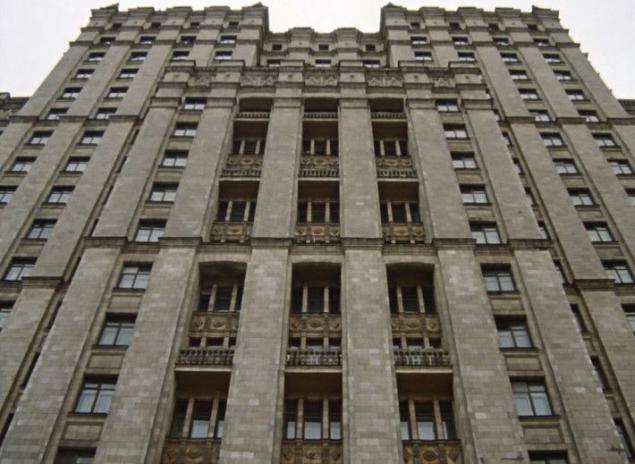
Luxurious marble foyer with lifts, reliefs and specially trained concierge proves once again that in the Soviet Union were all equal but some are more equal than others though.
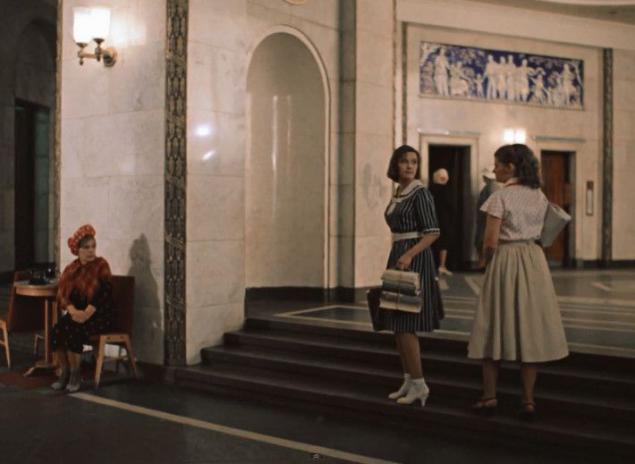
Caught in a multi (Feels like, four or five) apartment provincial-girlfriend, who were destined to live here for a month, came in a perfect agitation.
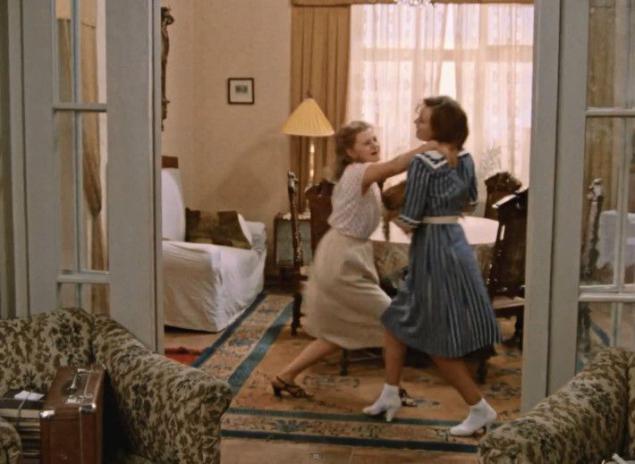
Professorial bedroom with a separate dressing table, telephone, elegant wallpaper and curtains.
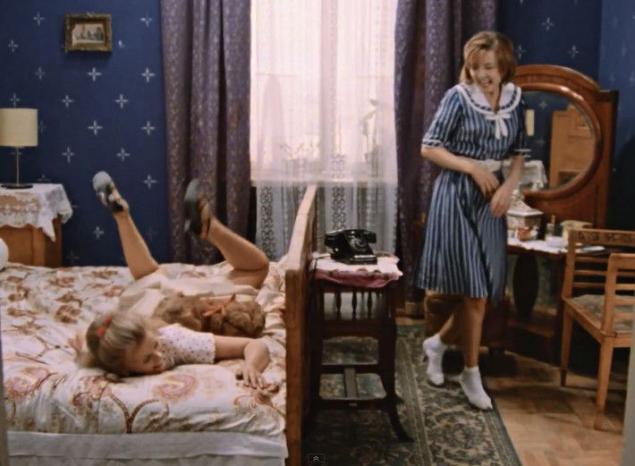
Private room for intellectual work.
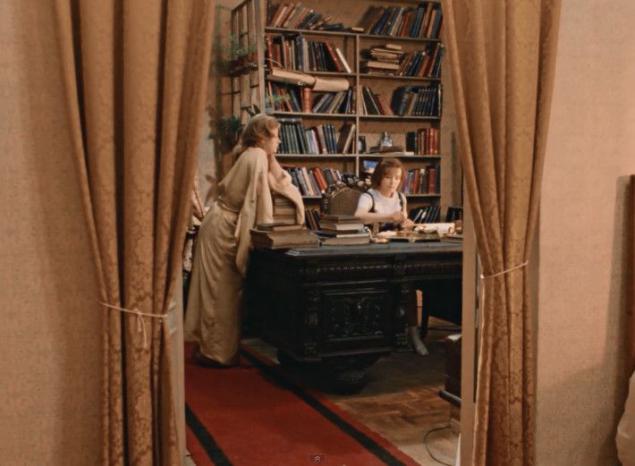
Dining: heavy wooden furniture, carved buffet and even a real TV "Leningrad».
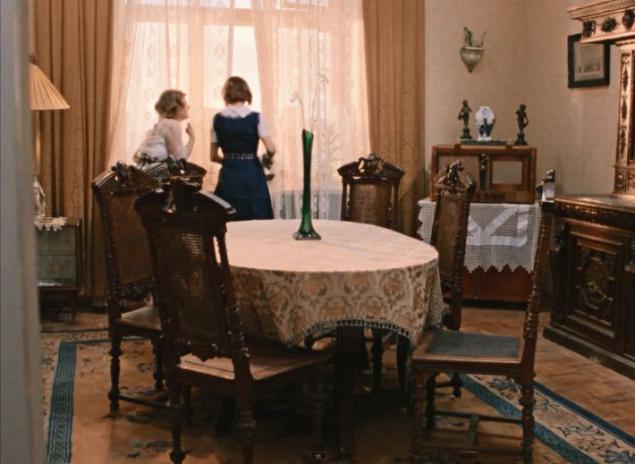
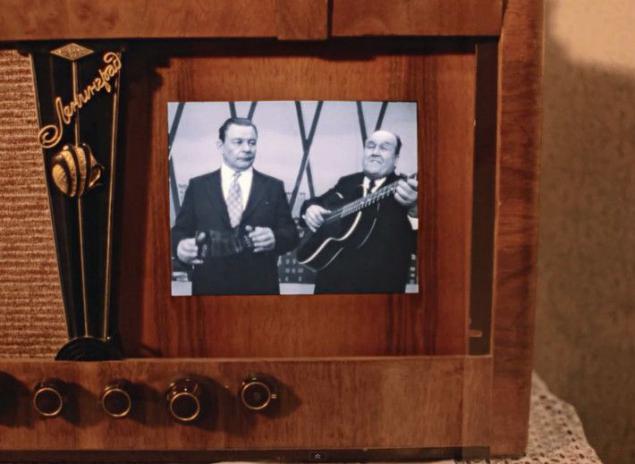
Kitchen.
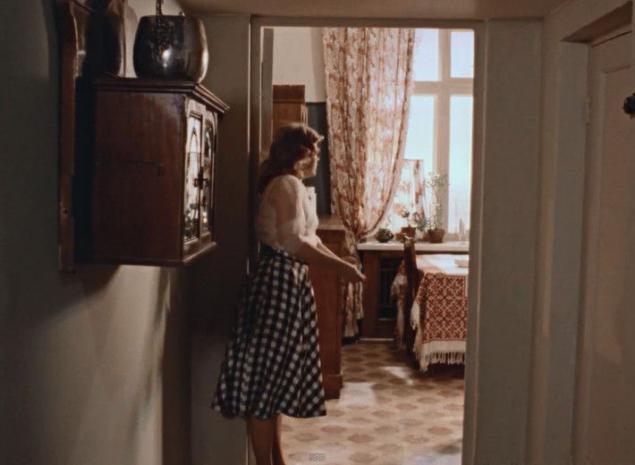
These little palace interiors, unthinkable for the vast majority of citizens of the Soviet Union, a friend used to search for the right of young people. The dream of marrying a successful Muscovite (as an option - to marry a Muscovite) or even residents of large cities, it is desirable for its living space, already owned the minds of adventurous visitors' limitchikov. " At a time when large-scale housing construction was just beginning, it was the most reliable method is guaranteed to stay in the city and quickly get out of the factory dormitory.
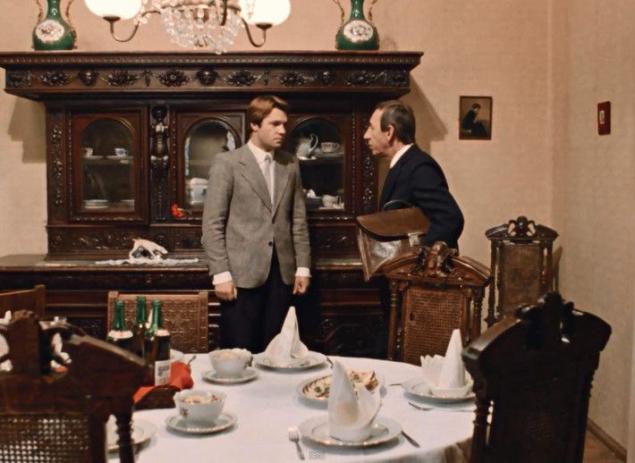
In honor while workers were central boards, scientists, engineers, athletes, poets and other members of the elite of Soviet society. Now the idea of the profession, would ensure decent living cell of society, times have changed dramatically.
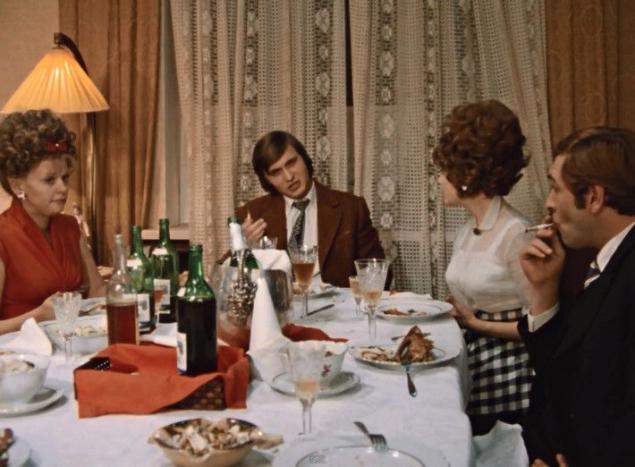
Catherine Tikhomirov drew cameraman Rudolf, who lived with his mother in a separate, but the two-room apartment, most likely in a typical "Stalinka" or early "Khrushchev." The family, according to the interior of the home, was very wealthy. The piano, radio, TV, china and crystal in the range. TV "Start 4", manufactured since the late 1960s, the apartment looks like 1958 mod.
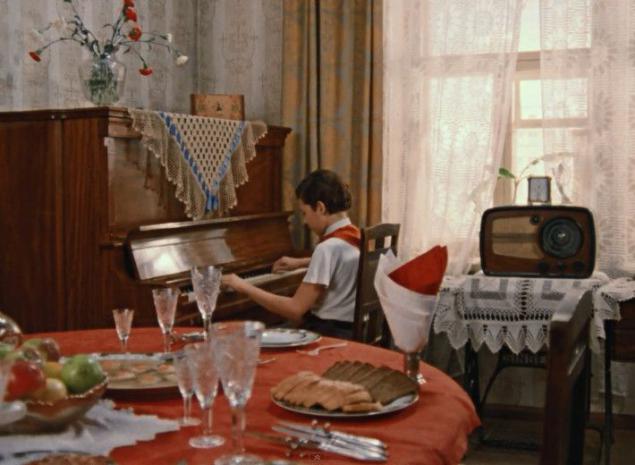
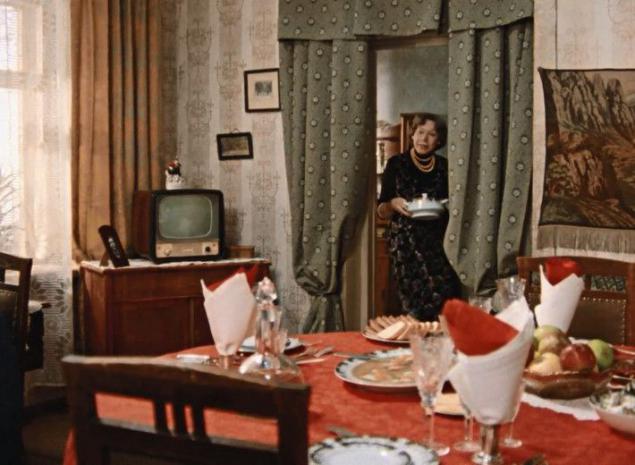
When meeting with the mother of Rudolph sounds wonderful dialogue, perfectly characterizes the "apartment" the morals of the time. - So tight for us, of course. - Why? In my opinion, a very nice apartment. - Well, are you out of politeness. Here you have, Rudic said, the apartment is really beautiful. - Never mind. Rudik because Mom does not know that the "daughter" of Professor Tikhomirov actually lives in a boarding school and working at the bench.
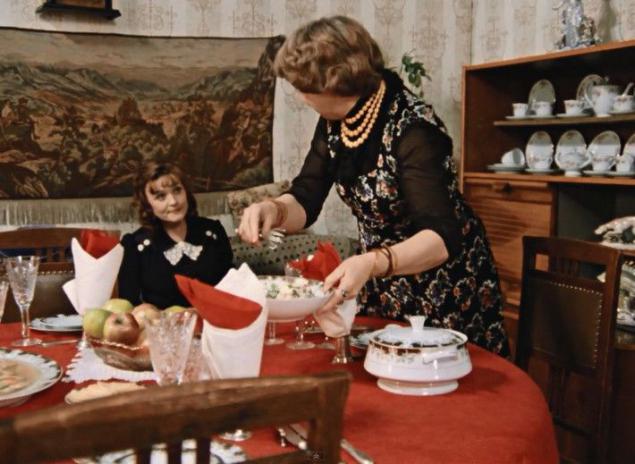
But when discovers a potential daughter-just beginning to like it a lot less. - I personally have lived in their shared apartment. Before you get something, it has to be earned, to earn. And so the four of us in two rooms, and there is no only you and your child. Here you will not pass! You will not get any meter. Human terrarium, which is a measure of a separate apartment consistency you as a person.
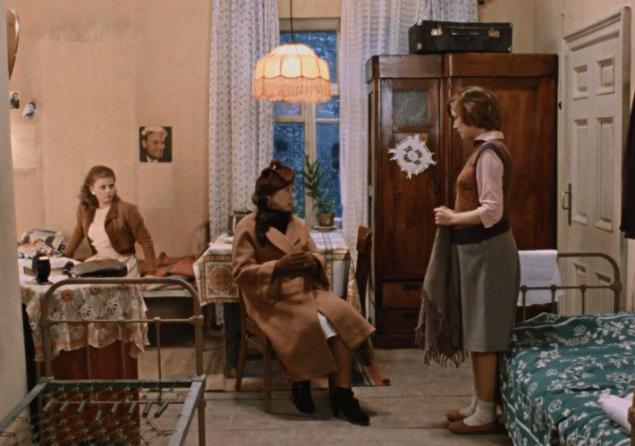
Katia Tikhomirova its still deserved and earned. In the second series the film is transferred to the end of 1970, and it turns out that the heroine - is the director of a plant, and it already has its own one-bedroom apartment for 2 people in a prestigious building of yellow brick.
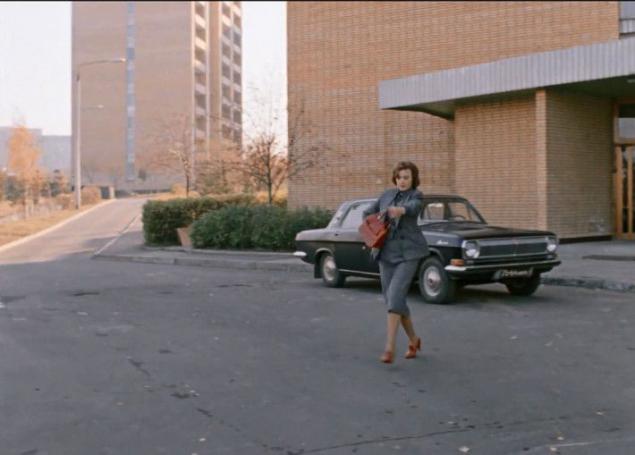
Pay attention to the parked cars in a residential area. The black "Volga" and a blue Mercedes should once again remind us of the new social status of the character, to get to the level parthoznomenklatury.
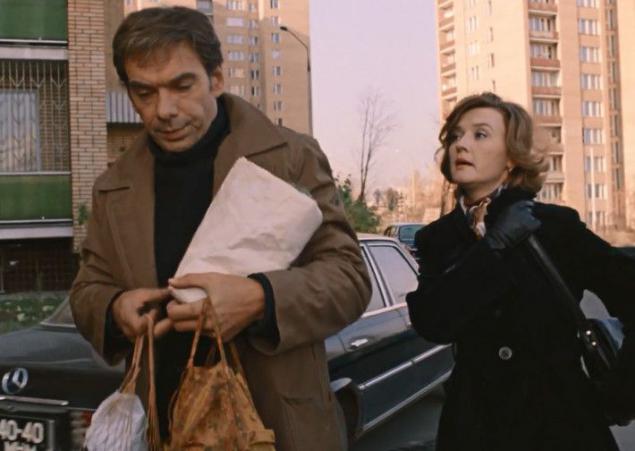
The interior of the hall: a yellow set of two armchairs and a sofa, nicknamed by the people "soft corner", "wall", perhaps even fashionable Yugoslav, color TV and music player - so look business-class housing in the midst of stagnation.
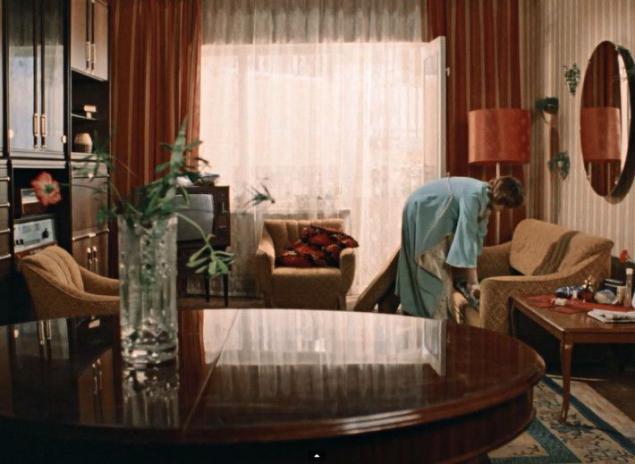
Room grown daughters - "bedroom". Alexandra own reel tape recorder.
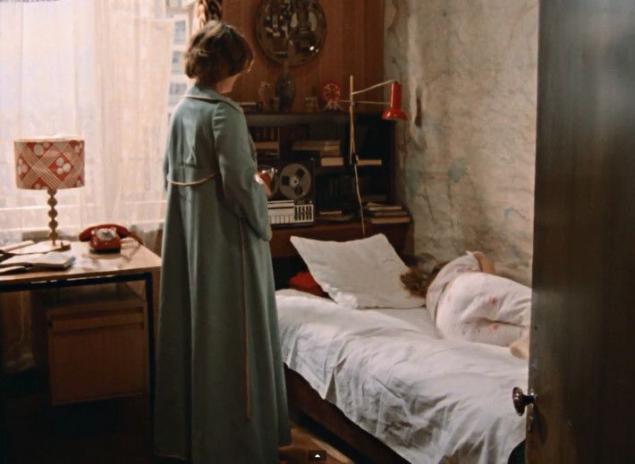
Corridor and bathroom. The apartment Tikhomirova quite popular in the Soviet Union planning. Next to the bathroom corridor to the kitchen.
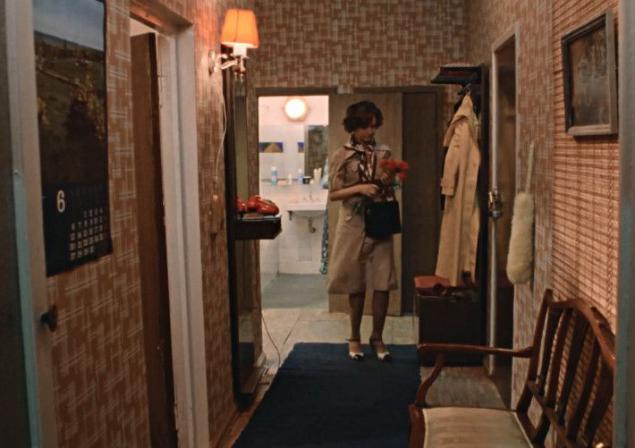
And a second TV, a laptop, installed in the kitchen.
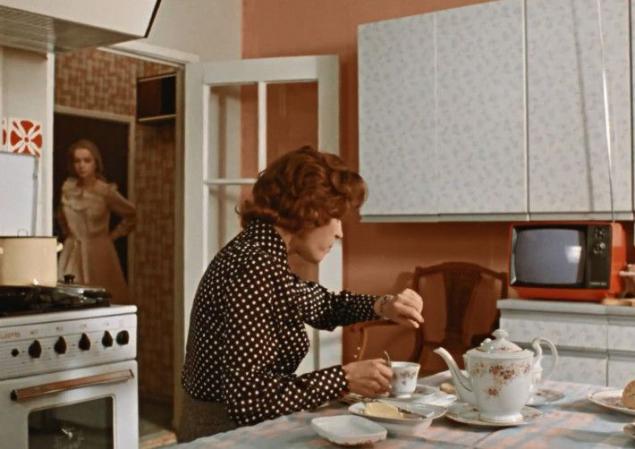
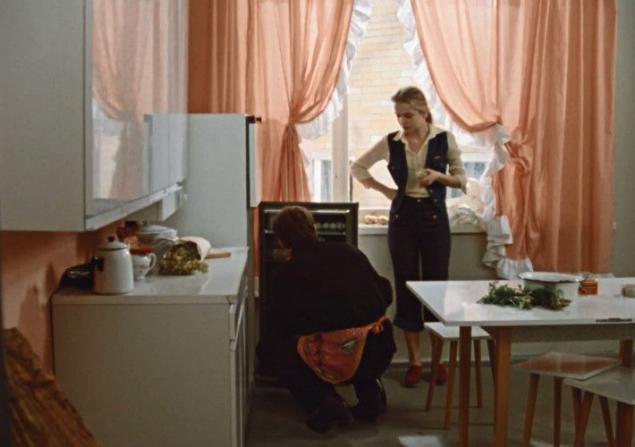
Another cult Soviet film, the plot of which directly involved the apartment, became an indispensable guest of the New Year TV screens many of the former Soviet Union - the melodramatic comedy Eldar Ryazanov, "Irony of Fate, or Enjoy Your Bath!».
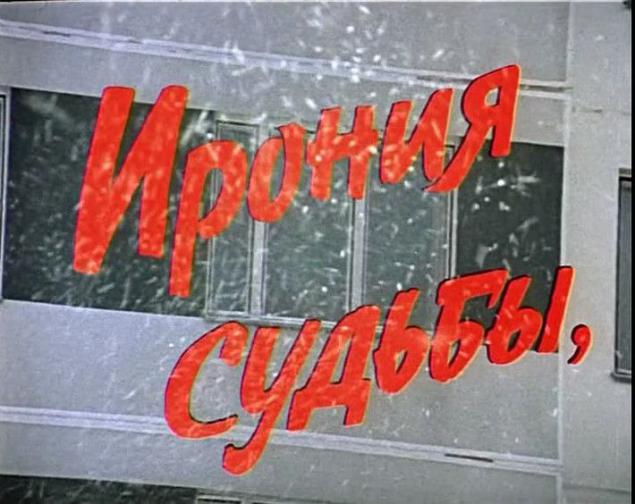
Released on television screens January 1, 1976 the story of a Moscow doctor Zhenya Lukashin got away with friends in the bath, I was in the apartment of the Leningrad teacher Nadia Sheveleva, became a kind of satire on the world of a typical panel housing with the same names of streets, houses and apartments.
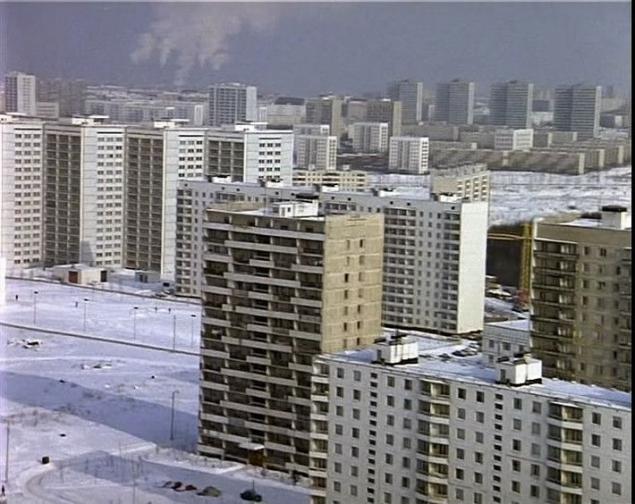
The scenery erected pavilions "Mosfilm", lovingly recreates the world of the Soviet stairwell era of stagnation. Strollers, mailboxes, fire hydrant and things relocating tenants with vintage TV-1960s.
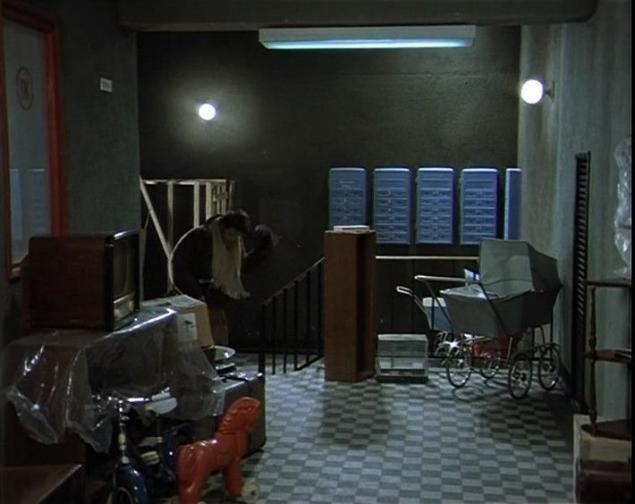
Standard 2 bedroom apartment in a panel building Lukashina near Cheryomushki usable area of 32 square meters with large entrance room. In fashion then there were lights in the form of candles.
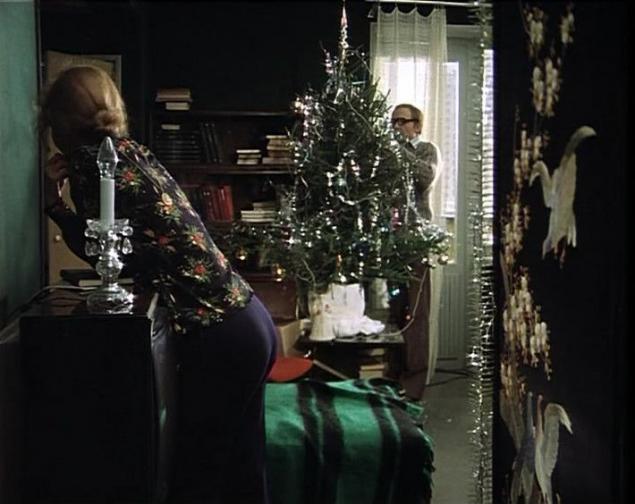
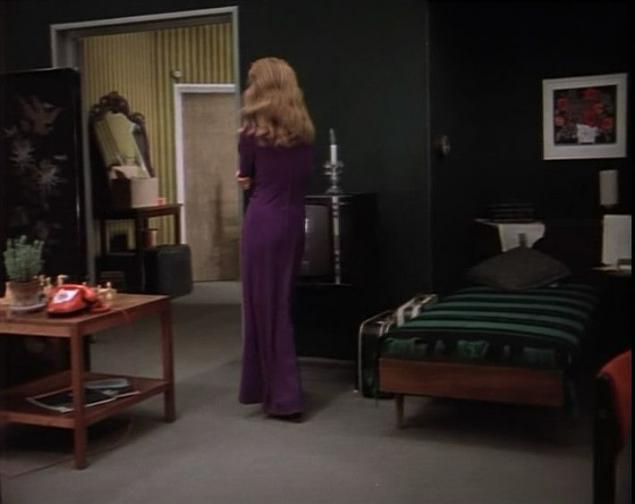
"Wall" with a single radio and a small passage in the "bedroom", which established the piano, an indispensable symbol of an educated family.
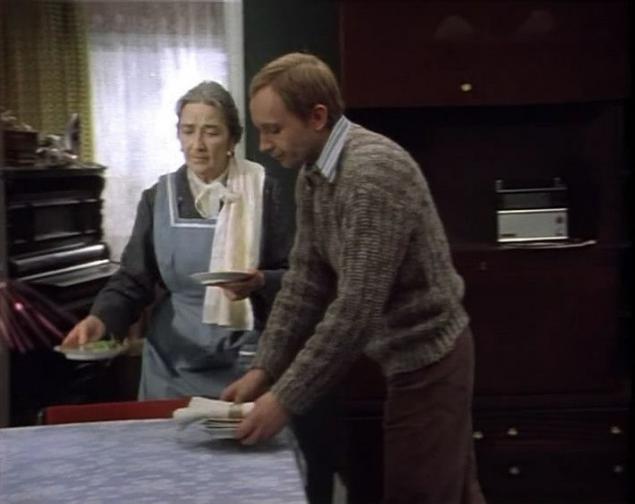
"Wall" with a single radio and a small passage in the "bedroom", which established the piano, an indispensable symbol of an educated family.
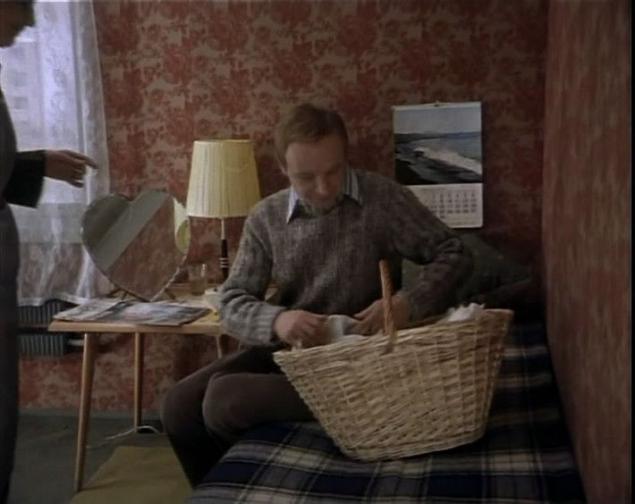
Kitchen with windows in the bathroom and a classic red with white polka dots banks for loose products.
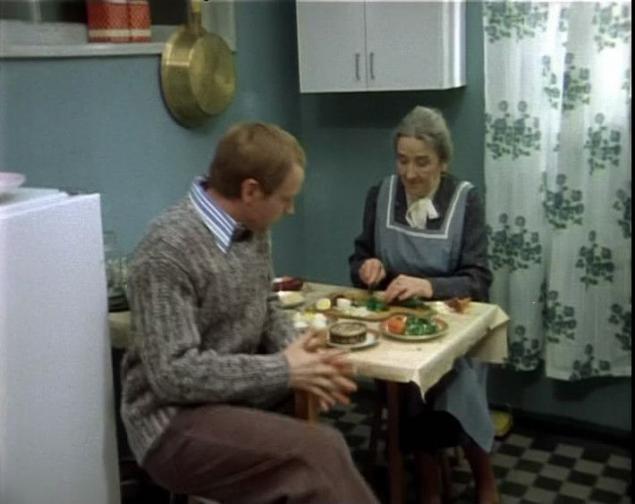
Leningrad teacher Sheveleva as Lukashin, also lives with his mother, but moved they appear later - in an apartment full of unpacked items. Even the refrigerator is still standing in a large room overlooking the hall.
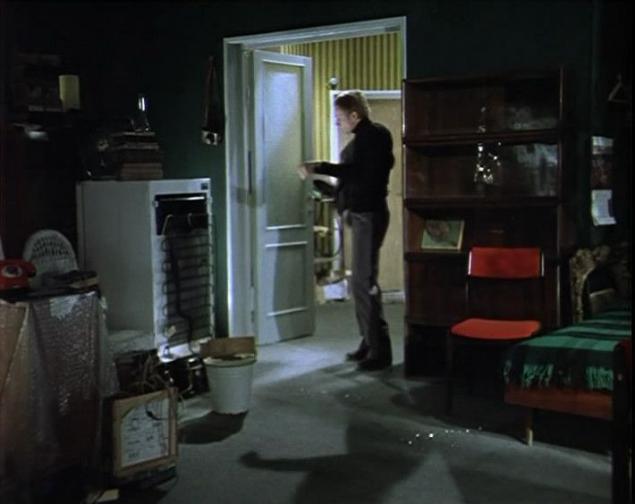
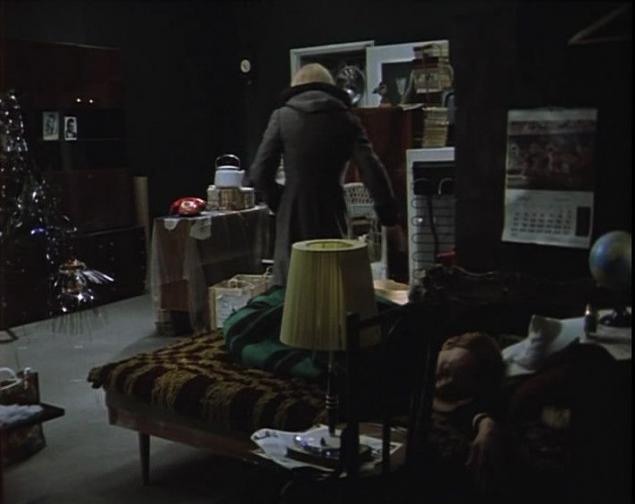
Bedroom Nadi. Women of color added to the sewing machine and mannequin.
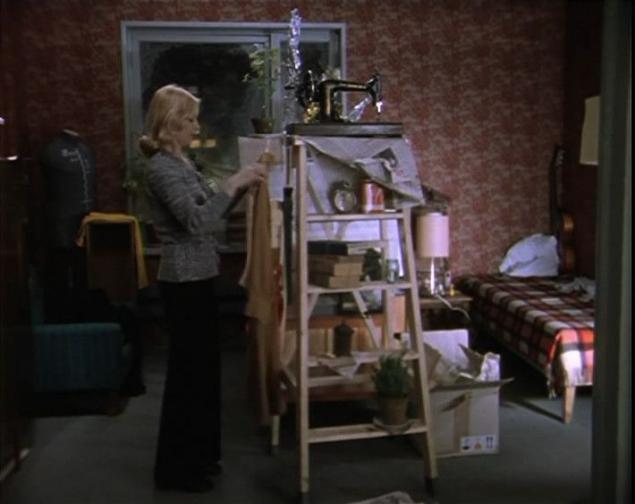
Mystery guest at the 3rd Street Builders in Leningrad finally discovered.
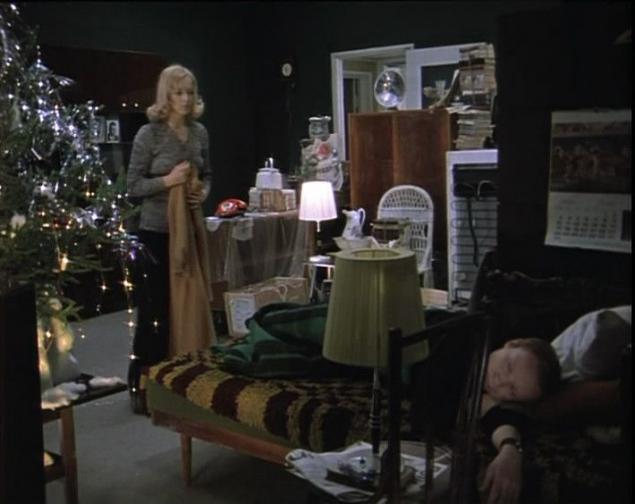
Oil lamp, Zhostovo tray, stack of books and a camera hanging on the wall give the heroine in person thin sincere organization. Nadia Sheveleva beginning of XXI century would have worked, for example, a copywriter, and it would be surrounded by the same camera, volume Coelho, moleskin, a cup of mate and a warm plaid.
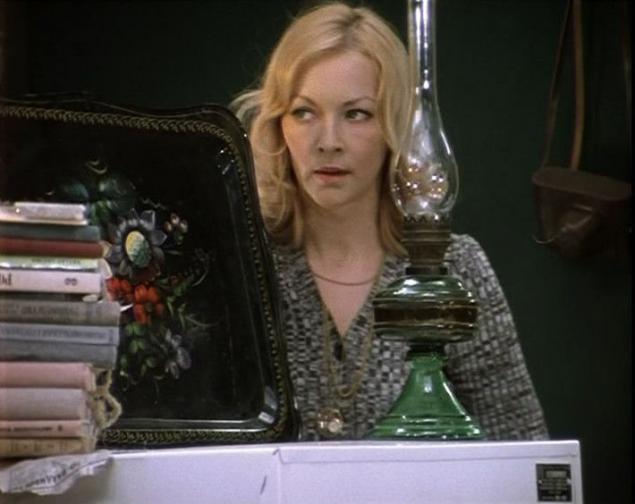
On the right in the background deficient "Polish headsets." - 830 rubles ... - 20 and above ... - I gave 25.
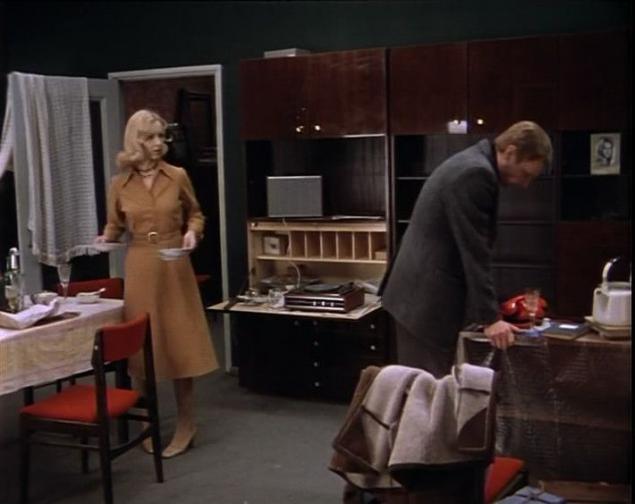
Kitchen Nadi. Loving traditional Russian crafts teacher by Barbara Brylska prefers banks for loose products made by "Gzhel».
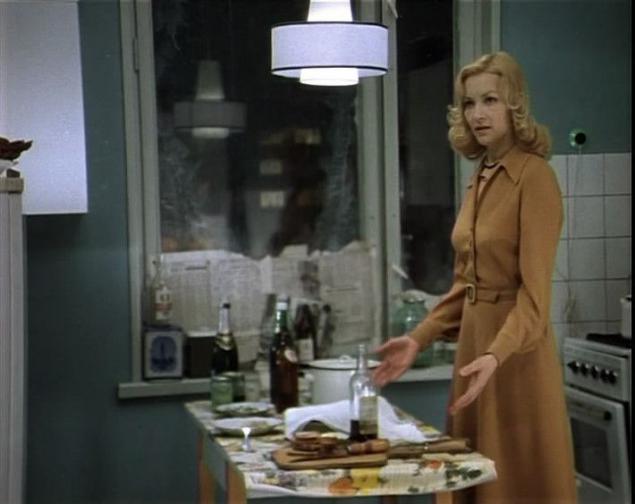
Finally, the bath, in which bathing accident Hippolyte.
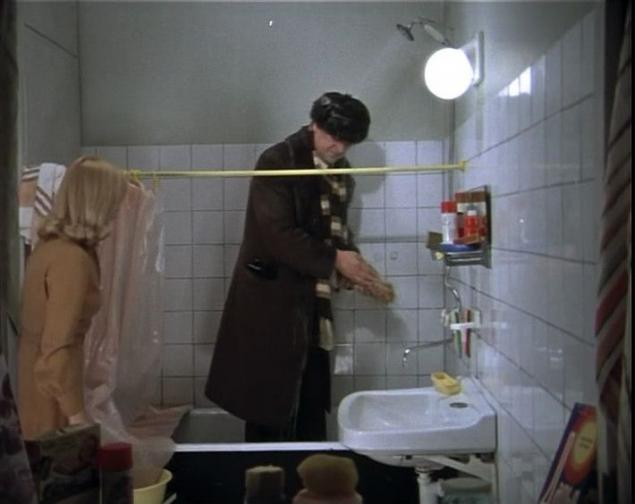
One of the major box office hits in the genre of lyrical comedy next decade became the Herald Bezhanova movie "The most charming and attractive." Released in 1985, the fascinating story about the search for the designer of the Institute TsNIIPrommash Nadia Kliueva simple female happiness looked 45 million viewers.
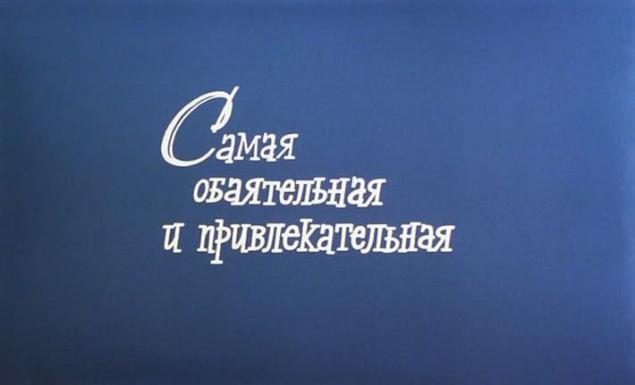
As usual, Nadia lives, of course, with my mother and thus in a very minimalistic furnished apartment typical technical workers.
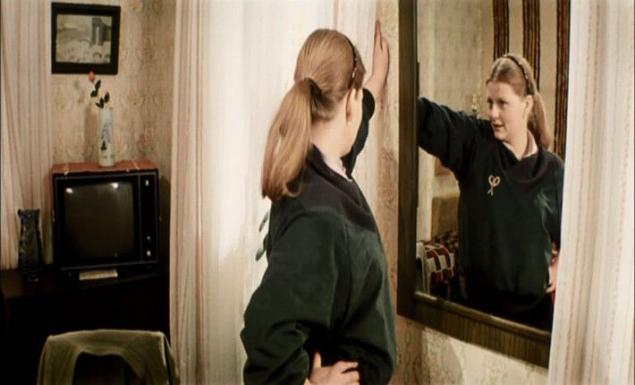
Angular olive green sofa, television, chair, wall - nothing more.
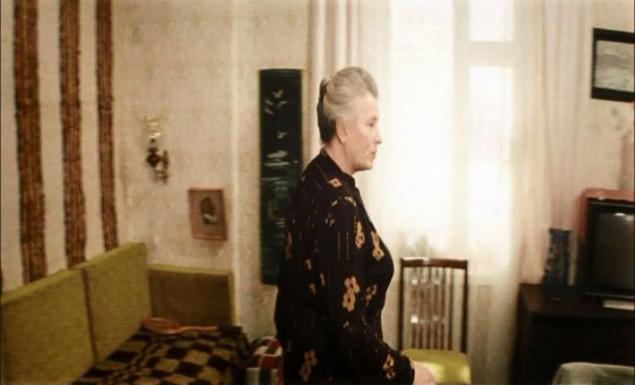
Contrast spot on this background looks pretty vanguard unless the picture.
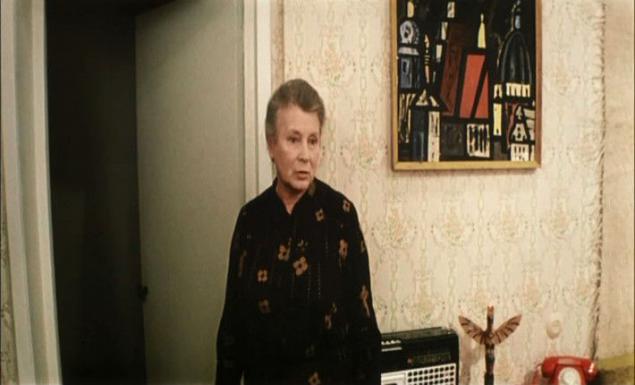
A striking contrast in comparison with the flat look of successful people the mid-1980s. For example, a black marketeer, dressed heroine in Cardin lives in the house №34 nomenclature on Malaya Bronnaya right in front of the Patriarch's Ponds. Even at the entrance hangs a thermometer.
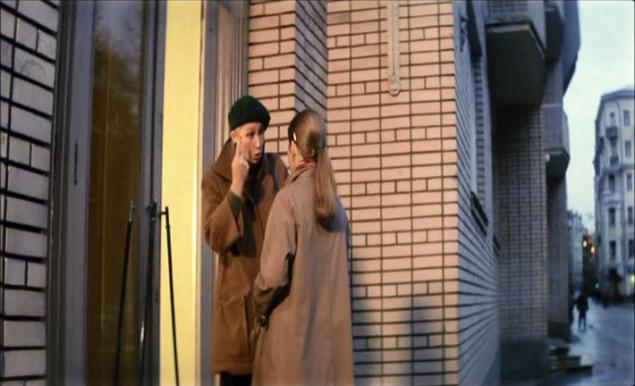
TV at black marketeer Sony Trinitron. Judging by the melodies and rhythms of the foreign stage, there is a VCR.
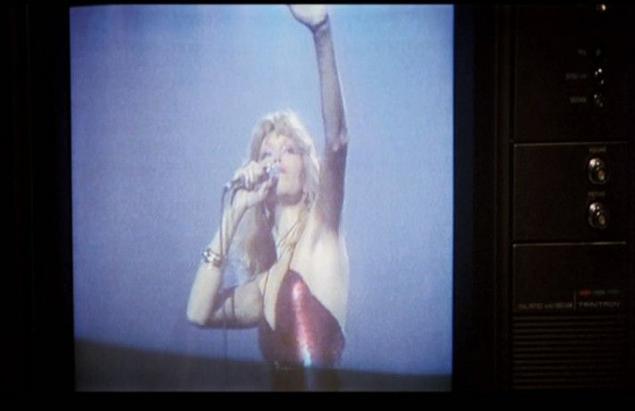
What is cotton, which labels!
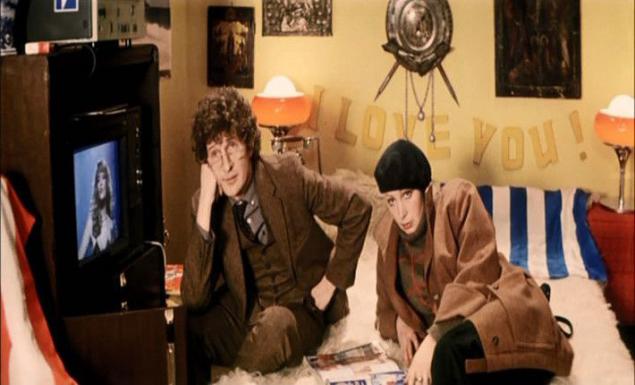
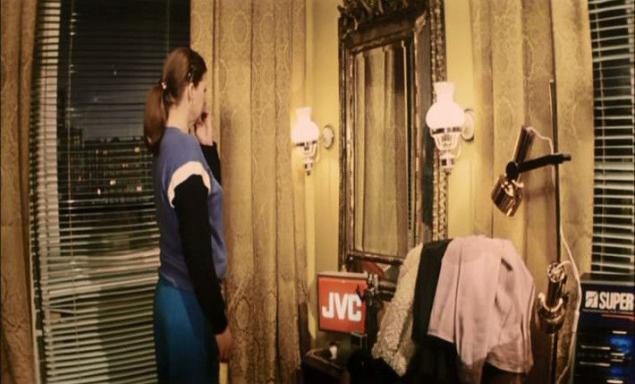
But Susanna apartments, a sociologist at the factory of household air conditioners and in combination the wife of conductor. Bright trendy cuisine, which is so convenient to cook pies "Maestro».
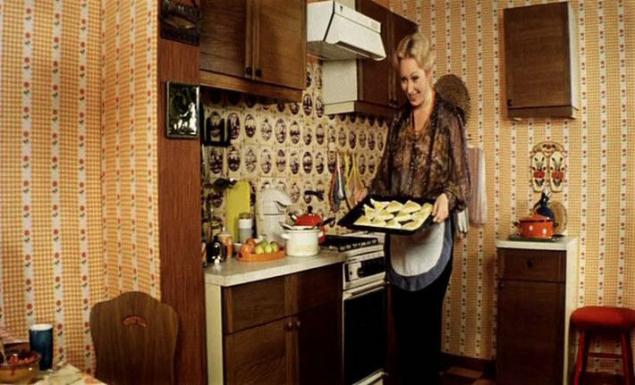
Again, the portable TV. A second TV in the apartment - a mandatory attribute of success in life.
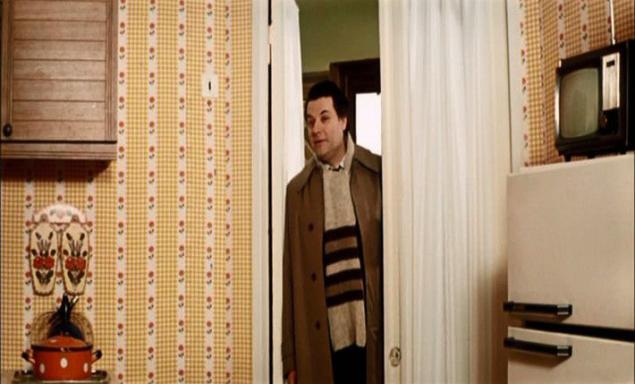
The landscape outside the window looks painted.
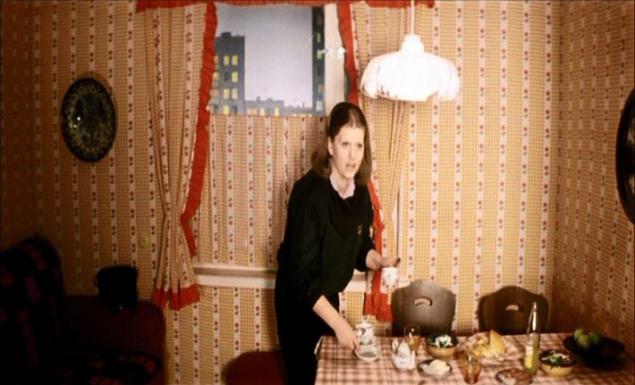
Telephone for antiques in the hallway.
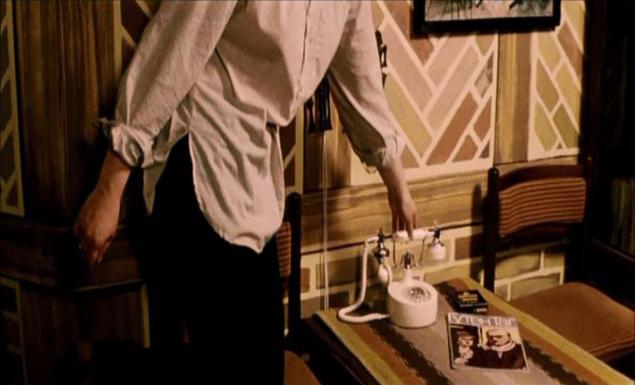
The large room is decorated in Japanese style. Could afford this mainly people who regularly travel abroad, as, for example, the husband of Susanna Conductor Arkady.
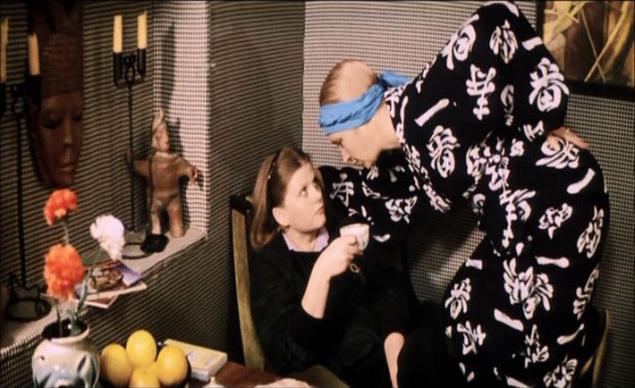
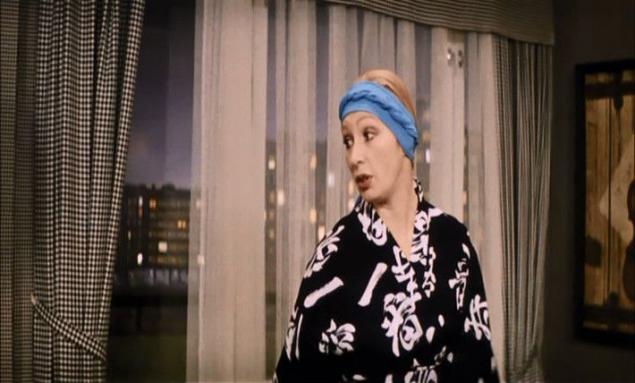
Note the huge corner "wall", the lack of mountains in its crystal and the presence of certain imported music center.
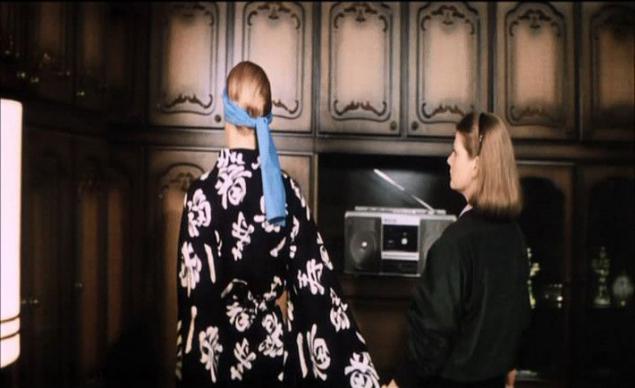
With the advent of perestroika and glasnost free thinking and come to the cinema of the USSR. Director and screenwriter was allowed to contact the previously taboo topics, which they fully took advantage of. Soviet unsophisticated moviegoer offered dozens, hundreds of movies, later received the definition of "seamy side". One of the most popular paintings of the Union was the sunset "" Accident "- the daughter ment" in 1989 Michael Tumanishvili.
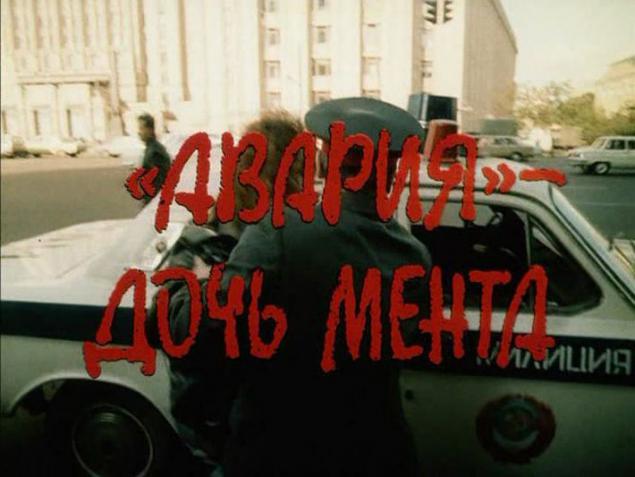
At the heart of this and many other films of this kind - a dysfunctional family, in this case, the traffic police lieutenant, whose daughter hit the outcry against bourgeois life parents.
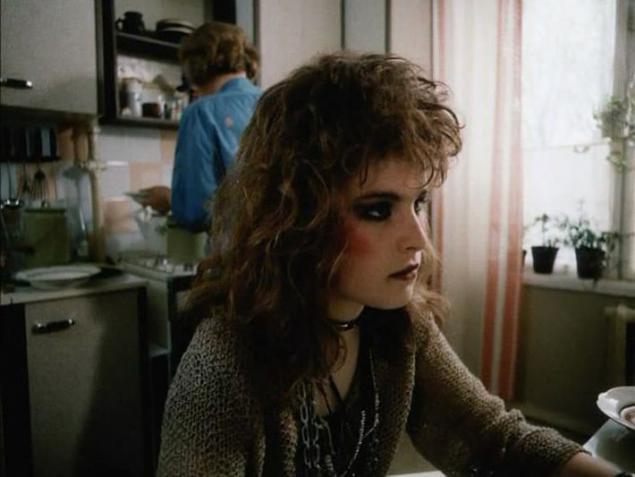
A typical flat 83% of Soviet citizens: soft corner, "wall", a carpet on the wall. Behind this facade of tough everyday family drama. - All the ancestors of the ancestors, and my sword belt fool!
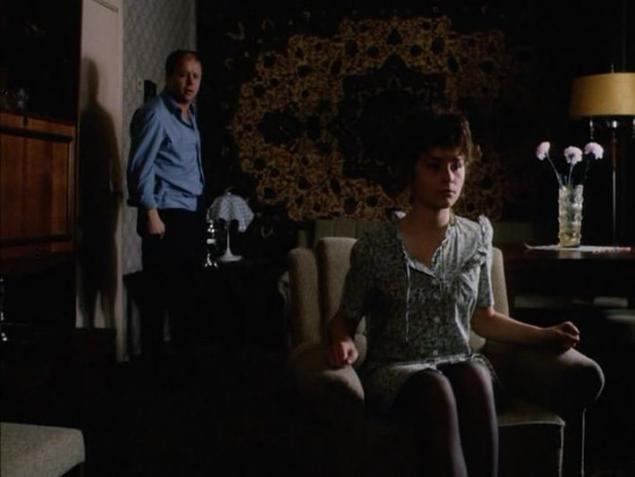
- What about the refrigerator. Writing for refrigerators starts from the beginning of the month. - Where are we one, then? - Duc "Rosenlew"! 900 rubles! - Sister requests a year. Listen, maybe it is our old and new to us ... Wait, what about the "wall"? - This is ... Here, you know, with one friend at a furniture store to talk. He needs "Baby", well, this washing machine. Well, we told him "Baby" will do, and he pohlopochet about the "wall." Recognizable dialogue an era of deficits. Bunch actively uses the merits of his grandfather, a war veteran, having the ability to get the right products out of turn.
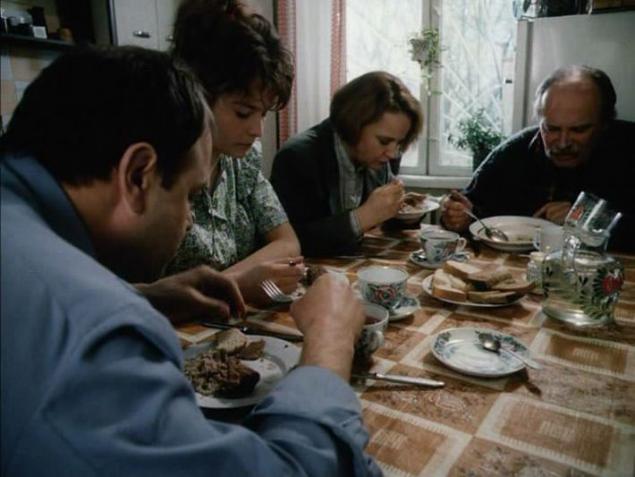
Throughout bears the stamp of decline and decay, not only material but also moral.
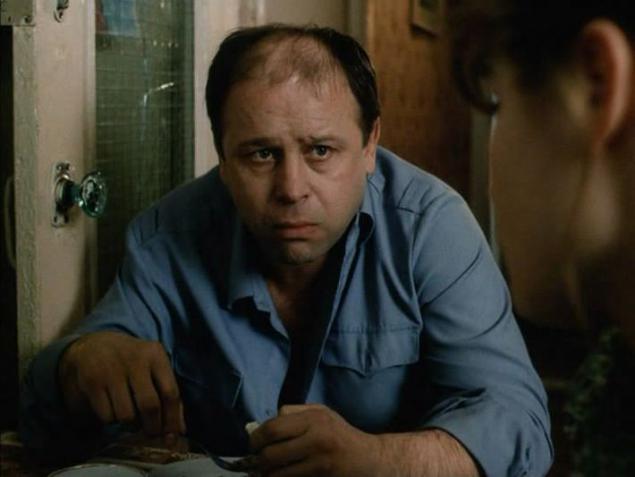
Districts-quarters of Moscow Yasenevo.
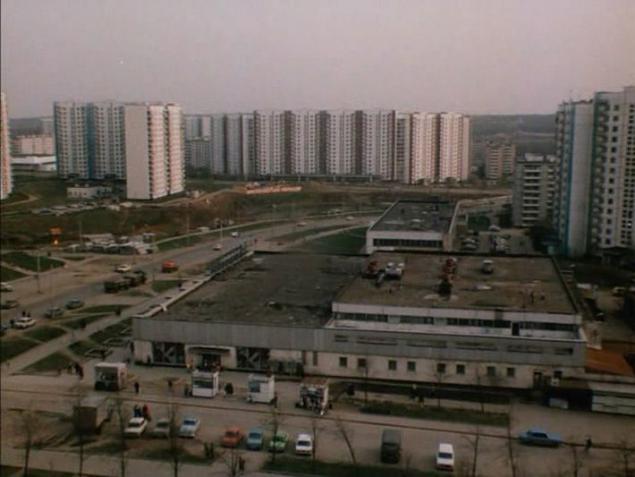
Once again escaped from his hole, "Crash" gets to visit a teacher Philology University. - Nishtyak you Hata - categorically said the heroine.
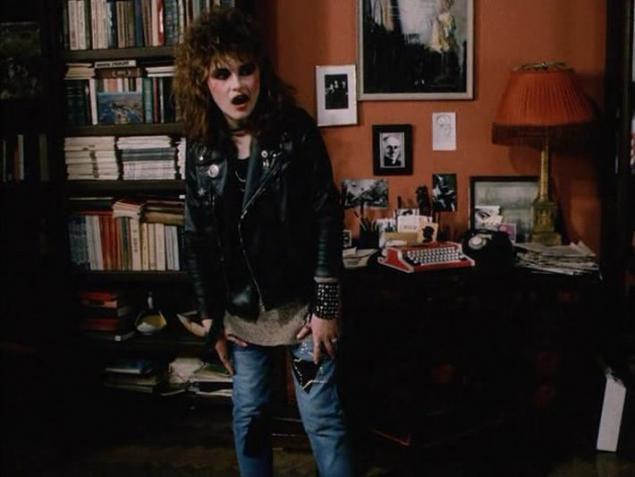
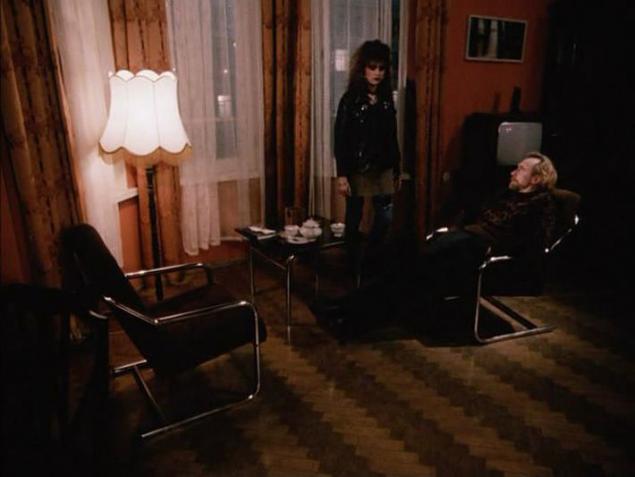
View toward the kitchen.
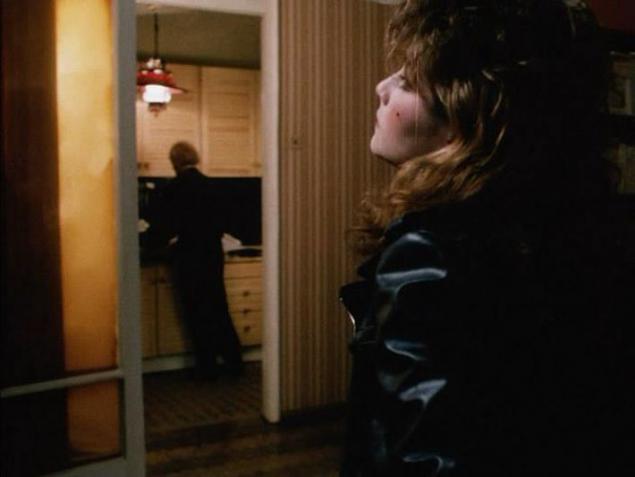
Bathroom.
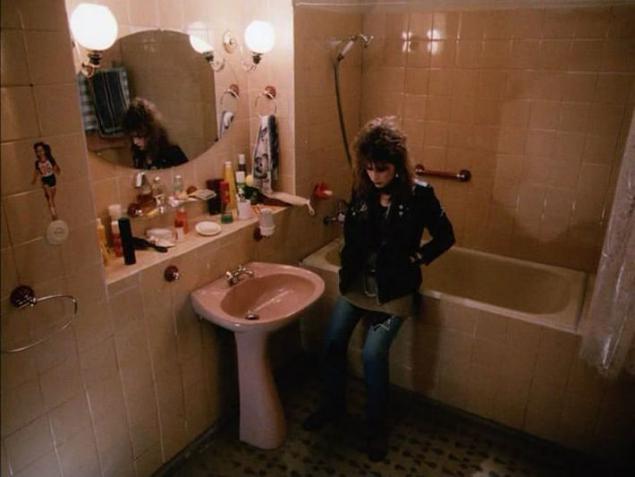
The bedroom where almost irreparable happens.
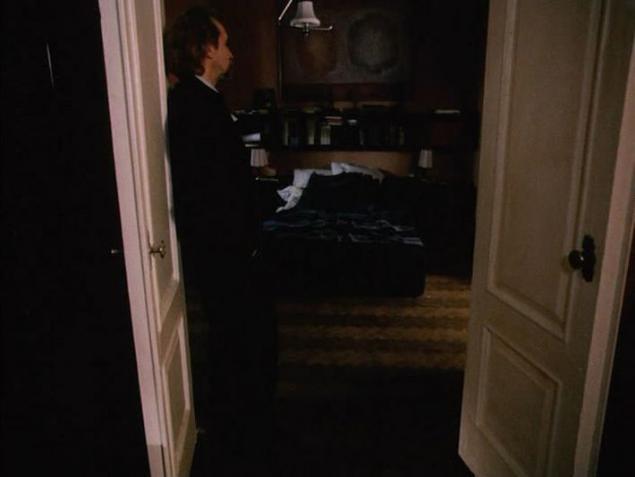
Irreparable happens later, and then rarely the illustrated earlier in the Soviet cinema style apartments, as the hangout.
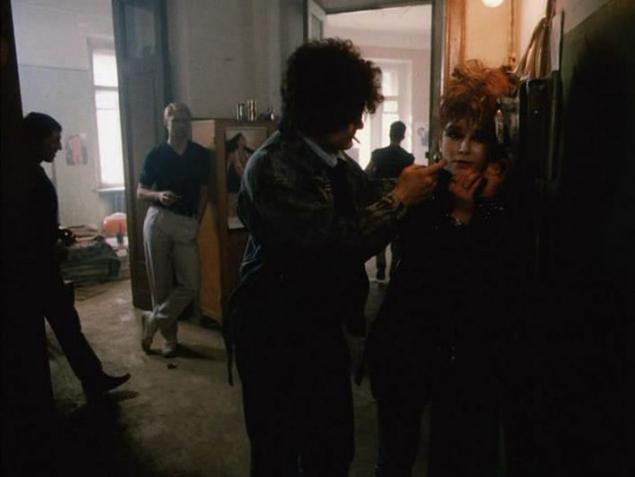
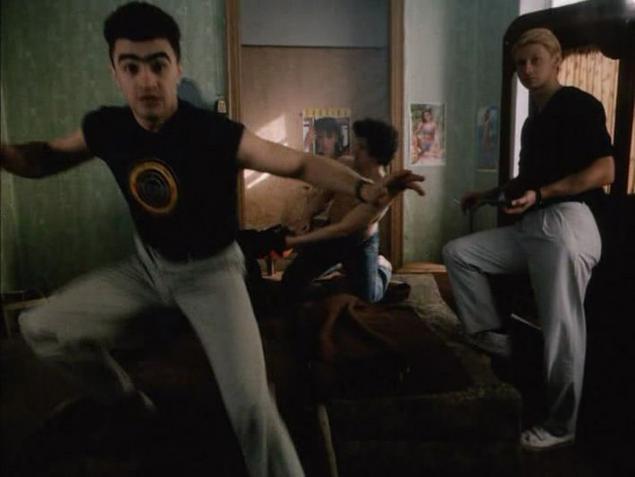
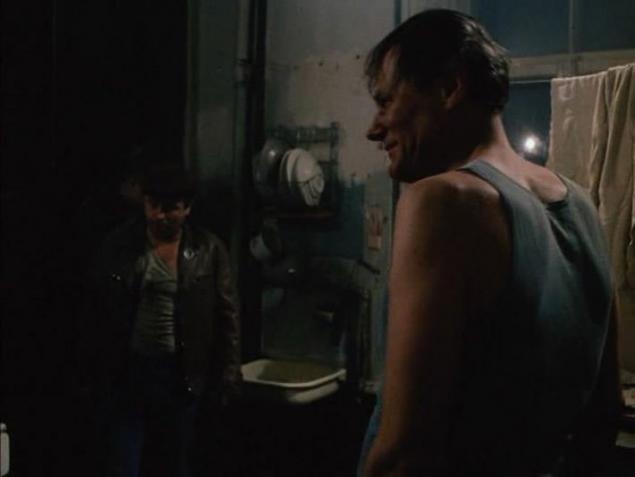
But perhaps the most acclaimed film since the restructuring was "Intergirl" Peter Todorovski. 44 million people came in 1989 in the movie theaters to see first how Tanya Zaitseva, a nurse and a currency prostitute, tried to exchange one-cooperative in Leningrad at the hateful sweet prosperous life in capitalist Sweden and what came of it.
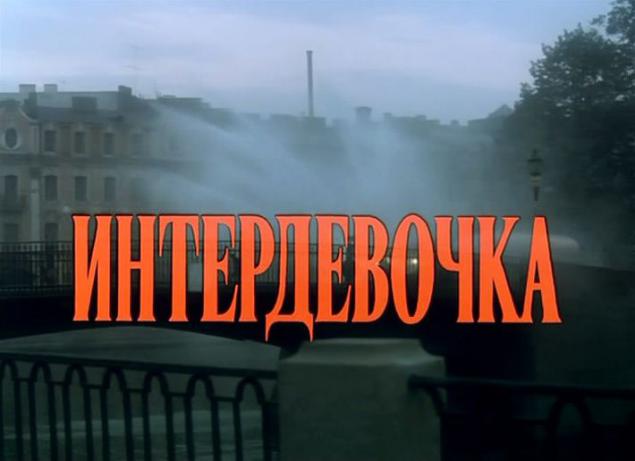
The same co-op on the street Dybenko, 32.
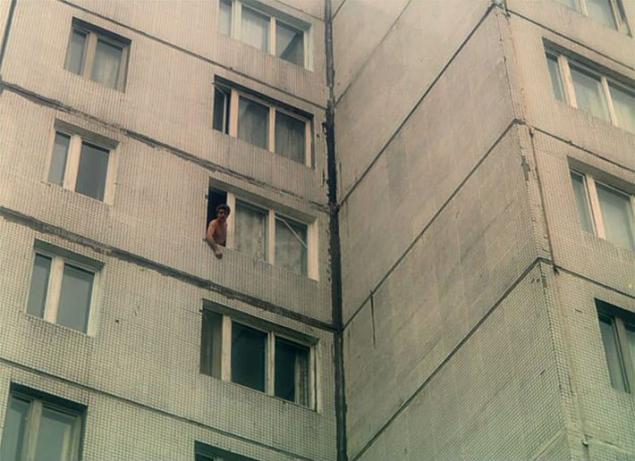
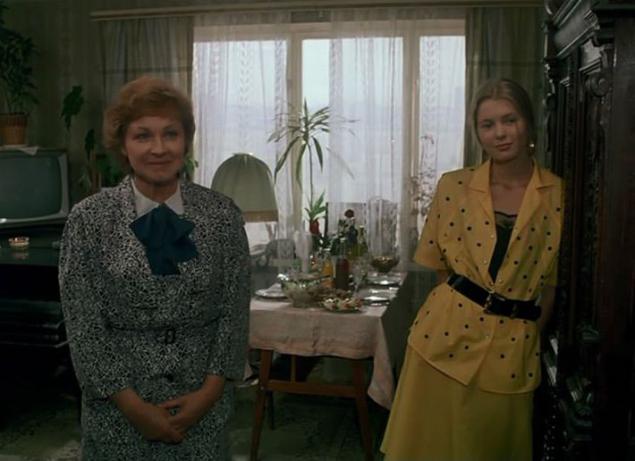
A small studio apartment - all I could get out of life heroine's mother, worked as a teacher. Zaitseva not enough. Moreover, the full triad "Soviet dream": apartment cottage machine - she, too, is not enough. At the beginning of the film "Intergirl" proclaims the consumer ideal of a new era: - I want my house, my car, I want to go to the store and buy the rags that I need, but not to run for the speculators! I want to see the world with my own eyes!
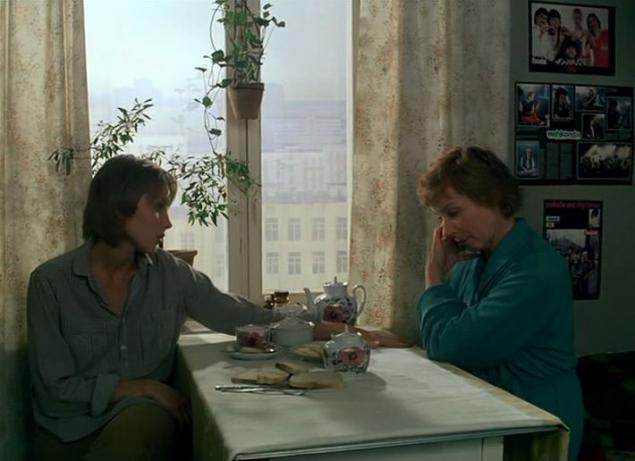
But to achieve this, the heroine will have to find a greedy father, who lives in a communal ...
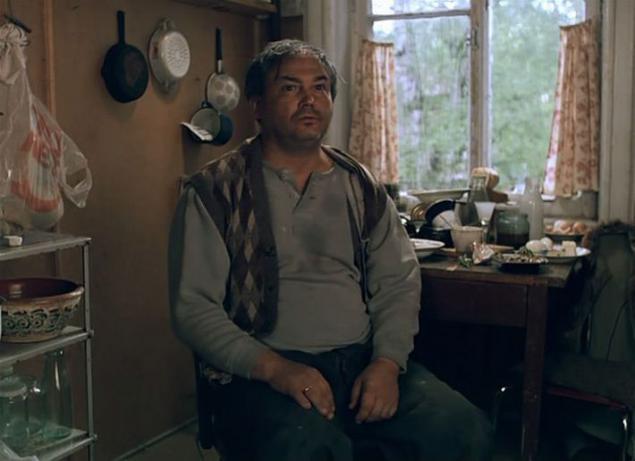
... And come back to the old fishing in removable dens.
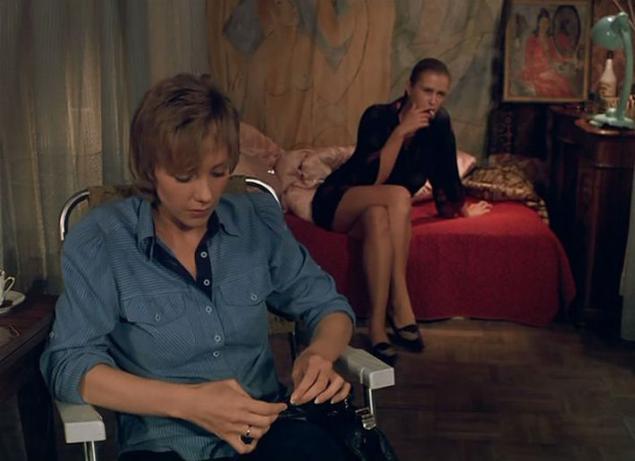
In the end, the dream has been achieved: there is a house and a car, and clothes, and 2 refrigerators, and even a computer, and the world under your feet, there's only human happiness, because the consumer paradise - it is in Sweden, and happiness to stay at home. < br />

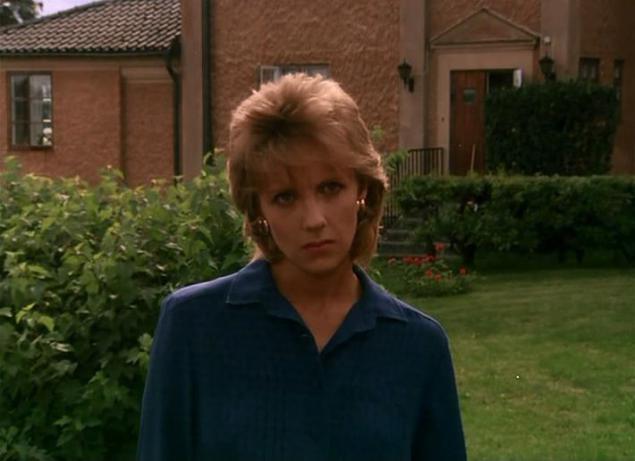
Prior to the onset of capitalism and there Zaitsev did not live just a couple of years.
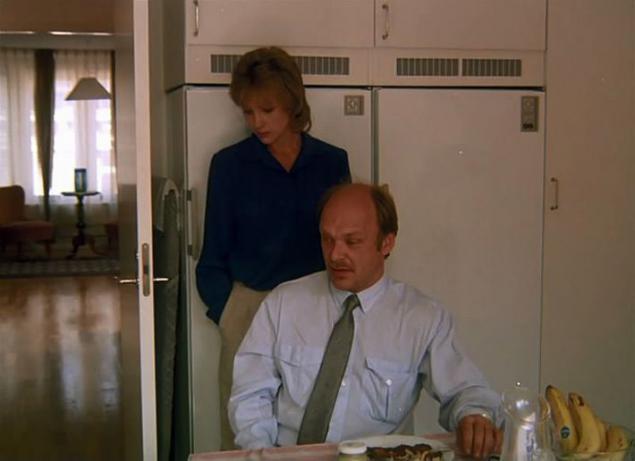
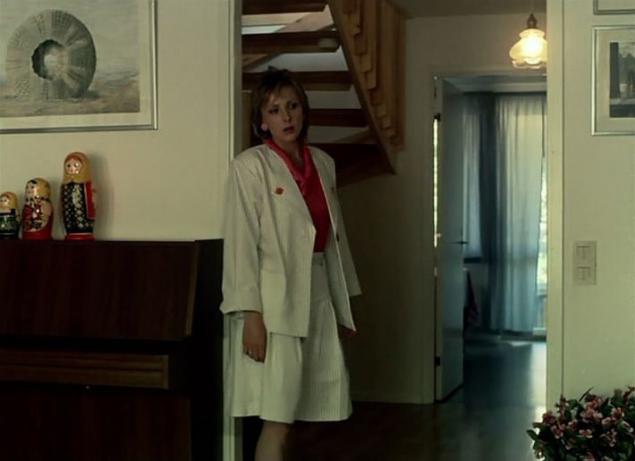
However, even after a quarter of a century following the housing problem continues to ruin the lives of people. Perhaps the culprit is that the landscape outside the majority of the population when one country in the 25 years since, in fact, has not changed.
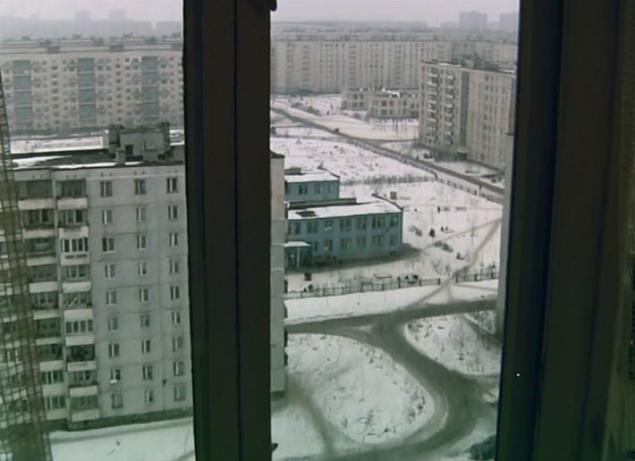
Source: www.onliner.by

The main film, personified the achievement of "Soviet dream", both in public life and personal, was the "Moscow Does Not Believe in Tears", Vladimir Menshov's melodrama, released in theaters in February 1980. The history of the transformation of the provincial student and also a single mother in a successful leader, who has 40 years of life has just begun, pleased, according to official estimates, more than 80 million moviegoers, and a myriad of TV fans.

It all started here, in close, but surprisingly friendly workers' hostel in 1958. 3 people in the room, carpets and portraits of your favorite artists on the walls - painting, in principle, familiar, and 65 years later.

Operating hostel - the lot of millions of people in rural areas and provincial towns, mass move to "capital" to meet the needs of a growing industry in cheap labor.

At the opposite end of the spectrum of all housing in Moscow were some luxury apartments in the "nomenklatura" Stalin's homes. Katya Tikhomirova, Vera Alentova heroine does not believe in tears Moscow, showed a distant relative of Professor, and in fact in this high-rise apartment in the area of the Rebellion.

Luxurious marble foyer with lifts, reliefs and specially trained concierge proves once again that in the Soviet Union were all equal but some are more equal than others though.

Caught in a multi (Feels like, four or five) apartment provincial-girlfriend, who were destined to live here for a month, came in a perfect agitation.

Professorial bedroom with a separate dressing table, telephone, elegant wallpaper and curtains.

Private room for intellectual work.

Dining: heavy wooden furniture, carved buffet and even a real TV "Leningrad».


Kitchen.

These little palace interiors, unthinkable for the vast majority of citizens of the Soviet Union, a friend used to search for the right of young people. The dream of marrying a successful Muscovite (as an option - to marry a Muscovite) or even residents of large cities, it is desirable for its living space, already owned the minds of adventurous visitors' limitchikov. " At a time when large-scale housing construction was just beginning, it was the most reliable method is guaranteed to stay in the city and quickly get out of the factory dormitory.

In honor while workers were central boards, scientists, engineers, athletes, poets and other members of the elite of Soviet society. Now the idea of the profession, would ensure decent living cell of society, times have changed dramatically.

Catherine Tikhomirov drew cameraman Rudolf, who lived with his mother in a separate, but the two-room apartment, most likely in a typical "Stalinka" or early "Khrushchev." The family, according to the interior of the home, was very wealthy. The piano, radio, TV, china and crystal in the range. TV "Start 4", manufactured since the late 1960s, the apartment looks like 1958 mod.


When meeting with the mother of Rudolph sounds wonderful dialogue, perfectly characterizes the "apartment" the morals of the time. - So tight for us, of course. - Why? In my opinion, a very nice apartment. - Well, are you out of politeness. Here you have, Rudic said, the apartment is really beautiful. - Never mind. Rudik because Mom does not know that the "daughter" of Professor Tikhomirov actually lives in a boarding school and working at the bench.

But when discovers a potential daughter-just beginning to like it a lot less. - I personally have lived in their shared apartment. Before you get something, it has to be earned, to earn. And so the four of us in two rooms, and there is no only you and your child. Here you will not pass! You will not get any meter. Human terrarium, which is a measure of a separate apartment consistency you as a person.

Katia Tikhomirova its still deserved and earned. In the second series the film is transferred to the end of 1970, and it turns out that the heroine - is the director of a plant, and it already has its own one-bedroom apartment for 2 people in a prestigious building of yellow brick.

Pay attention to the parked cars in a residential area. The black "Volga" and a blue Mercedes should once again remind us of the new social status of the character, to get to the level parthoznomenklatury.

The interior of the hall: a yellow set of two armchairs and a sofa, nicknamed by the people "soft corner", "wall", perhaps even fashionable Yugoslav, color TV and music player - so look business-class housing in the midst of stagnation.

Room grown daughters - "bedroom". Alexandra own reel tape recorder.

Corridor and bathroom. The apartment Tikhomirova quite popular in the Soviet Union planning. Next to the bathroom corridor to the kitchen.

And a second TV, a laptop, installed in the kitchen.


Another cult Soviet film, the plot of which directly involved the apartment, became an indispensable guest of the New Year TV screens many of the former Soviet Union - the melodramatic comedy Eldar Ryazanov, "Irony of Fate, or Enjoy Your Bath!».

Released on television screens January 1, 1976 the story of a Moscow doctor Zhenya Lukashin got away with friends in the bath, I was in the apartment of the Leningrad teacher Nadia Sheveleva, became a kind of satire on the world of a typical panel housing with the same names of streets, houses and apartments.

The scenery erected pavilions "Mosfilm", lovingly recreates the world of the Soviet stairwell era of stagnation. Strollers, mailboxes, fire hydrant and things relocating tenants with vintage TV-1960s.

Standard 2 bedroom apartment in a panel building Lukashina near Cheryomushki usable area of 32 square meters with large entrance room. In fashion then there were lights in the form of candles.


"Wall" with a single radio and a small passage in the "bedroom", which established the piano, an indispensable symbol of an educated family.

"Wall" with a single radio and a small passage in the "bedroom", which established the piano, an indispensable symbol of an educated family.

Kitchen with windows in the bathroom and a classic red with white polka dots banks for loose products.

Leningrad teacher Sheveleva as Lukashin, also lives with his mother, but moved they appear later - in an apartment full of unpacked items. Even the refrigerator is still standing in a large room overlooking the hall.


Bedroom Nadi. Women of color added to the sewing machine and mannequin.

Mystery guest at the 3rd Street Builders in Leningrad finally discovered.

Oil lamp, Zhostovo tray, stack of books and a camera hanging on the wall give the heroine in person thin sincere organization. Nadia Sheveleva beginning of XXI century would have worked, for example, a copywriter, and it would be surrounded by the same camera, volume Coelho, moleskin, a cup of mate and a warm plaid.

On the right in the background deficient "Polish headsets." - 830 rubles ... - 20 and above ... - I gave 25.

Kitchen Nadi. Loving traditional Russian crafts teacher by Barbara Brylska prefers banks for loose products made by "Gzhel».

Finally, the bath, in which bathing accident Hippolyte.

One of the major box office hits in the genre of lyrical comedy next decade became the Herald Bezhanova movie "The most charming and attractive." Released in 1985, the fascinating story about the search for the designer of the Institute TsNIIPrommash Nadia Kliueva simple female happiness looked 45 million viewers.

As usual, Nadia lives, of course, with my mother and thus in a very minimalistic furnished apartment typical technical workers.

Angular olive green sofa, television, chair, wall - nothing more.

Contrast spot on this background looks pretty vanguard unless the picture.

A striking contrast in comparison with the flat look of successful people the mid-1980s. For example, a black marketeer, dressed heroine in Cardin lives in the house №34 nomenclature on Malaya Bronnaya right in front of the Patriarch's Ponds. Even at the entrance hangs a thermometer.

TV at black marketeer Sony Trinitron. Judging by the melodies and rhythms of the foreign stage, there is a VCR.

What is cotton, which labels!


But Susanna apartments, a sociologist at the factory of household air conditioners and in combination the wife of conductor. Bright trendy cuisine, which is so convenient to cook pies "Maestro».

Again, the portable TV. A second TV in the apartment - a mandatory attribute of success in life.

The landscape outside the window looks painted.

Telephone for antiques in the hallway.

The large room is decorated in Japanese style. Could afford this mainly people who regularly travel abroad, as, for example, the husband of Susanna Conductor Arkady.


Note the huge corner "wall", the lack of mountains in its crystal and the presence of certain imported music center.

With the advent of perestroika and glasnost free thinking and come to the cinema of the USSR. Director and screenwriter was allowed to contact the previously taboo topics, which they fully took advantage of. Soviet unsophisticated moviegoer offered dozens, hundreds of movies, later received the definition of "seamy side". One of the most popular paintings of the Union was the sunset "" Accident "- the daughter ment" in 1989 Michael Tumanishvili.

At the heart of this and many other films of this kind - a dysfunctional family, in this case, the traffic police lieutenant, whose daughter hit the outcry against bourgeois life parents.

A typical flat 83% of Soviet citizens: soft corner, "wall", a carpet on the wall. Behind this facade of tough everyday family drama. - All the ancestors of the ancestors, and my sword belt fool!

- What about the refrigerator. Writing for refrigerators starts from the beginning of the month. - Where are we one, then? - Duc "Rosenlew"! 900 rubles! - Sister requests a year. Listen, maybe it is our old and new to us ... Wait, what about the "wall"? - This is ... Here, you know, with one friend at a furniture store to talk. He needs "Baby", well, this washing machine. Well, we told him "Baby" will do, and he pohlopochet about the "wall." Recognizable dialogue an era of deficits. Bunch actively uses the merits of his grandfather, a war veteran, having the ability to get the right products out of turn.

Throughout bears the stamp of decline and decay, not only material but also moral.

Districts-quarters of Moscow Yasenevo.

Once again escaped from his hole, "Crash" gets to visit a teacher Philology University. - Nishtyak you Hata - categorically said the heroine.


View toward the kitchen.

Bathroom.

The bedroom where almost irreparable happens.

Irreparable happens later, and then rarely the illustrated earlier in the Soviet cinema style apartments, as the hangout.



But perhaps the most acclaimed film since the restructuring was "Intergirl" Peter Todorovski. 44 million people came in 1989 in the movie theaters to see first how Tanya Zaitseva, a nurse and a currency prostitute, tried to exchange one-cooperative in Leningrad at the hateful sweet prosperous life in capitalist Sweden and what came of it.

The same co-op on the street Dybenko, 32.


A small studio apartment - all I could get out of life heroine's mother, worked as a teacher. Zaitseva not enough. Moreover, the full triad "Soviet dream": apartment cottage machine - she, too, is not enough. At the beginning of the film "Intergirl" proclaims the consumer ideal of a new era: - I want my house, my car, I want to go to the store and buy the rags that I need, but not to run for the speculators! I want to see the world with my own eyes!

But to achieve this, the heroine will have to find a greedy father, who lives in a communal ...

... And come back to the old fishing in removable dens.

In the end, the dream has been achieved: there is a house and a car, and clothes, and 2 refrigerators, and even a computer, and the world under your feet, there's only human happiness, because the consumer paradise - it is in Sweden, and happiness to stay at home. < br />


Prior to the onset of capitalism and there Zaitsev did not live just a couple of years.


However, even after a quarter of a century following the housing problem continues to ruin the lives of people. Perhaps the culprit is that the landscape outside the majority of the population when one country in the 25 years since, in fact, has not changed.

Source: www.onliner.by



